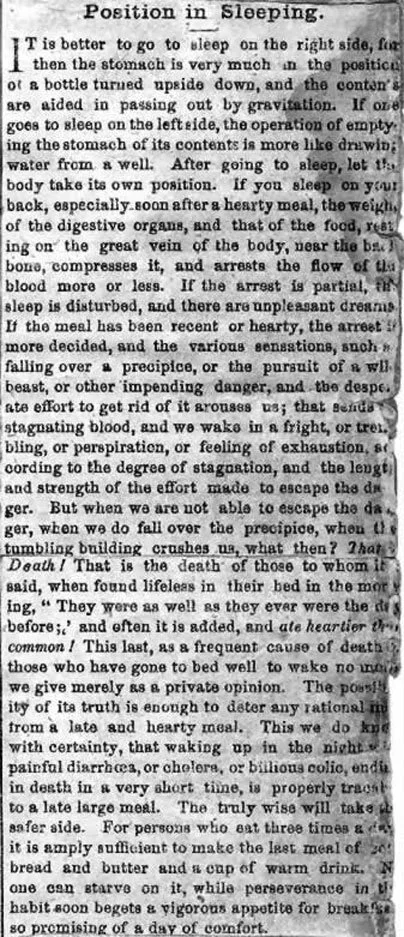SLEEP
There is no fact more clearly established in the physiology of man than this, that the brain expends its energies and itself during the hours of wakefulness and that these are recuperated during sleep; if the recuperation does not equal the expenditure, the brain withers – this is insanity. Thus it is that in early English history, persons who were condemned to death by being prevented from sleeping always died raving maniacs; thus it is, also, that those who are starved to death become insane; the brain is not nourished, and they cannot sleep. The practical inferences are these: -
Those who think most, who do most brain work, require more sleep.
That time saved from necessary sleep is infallibly destructive to mind, body, and estate.
Give yourself, your children, your servants – give all that are under you the fullest amount of sleep they will take, by compelling them to retire at some regular hour, and to rise the moment they wake; and within a fortnight, nature, with almost the regularity of the sun, will impose the bands of sleep the moment enough repose has been secured for the wants of the system. This is the only safe and sufficient rule; and as to the question how much sleep anyone required, each must be a rule for himself; great nature will never fail to write it out to the observer under the regulations just given.
SLEEP
The amount of sleep (as measured by hours) required to keep the mind and body in health varies with the age, habits, temperament, and particular circumstances of the individual. In childhood more sleep is required than in old age, and in old age more than in manhood. Children may safely be allowed to sleep as much and as often as they are inclined. For the adult, no absolute rule can be laid down. In the general way, St. Augustine’s division of his day into eight hours for work, eight hours for food and recreation, and eight hours for sleep, is worthy of adoption. Some require more. Some can do with less than eight hours sleep. General Elliot, the hero of Gibraltar, slept only four hours out of the twenty-four. Frederick the Great and John Hunter each took five hours. Du Moivre, the French mathematician, is said to have slept for 20 hours out of the 24; and Dr. Reid, the metaphysician, could take as much food at once, and after it as much sleep, as sufficed him for two days. But all such are exceptional cases. On the average, eight hours is neither too much nor too little.
POSITION IN SLEEPING
It is better to go to sleep on the right side, for then the stomach is very much in the position of a bottle turned upside down, and the contents are sided in passing out by gravitation. If one goes to sleep on the left side, the operation of emptying the stomach of its contents is more like drawing water from a well. After going to sleep, let the body take its own position. If you sleep on your back, especially soon after a hearty meal, the weight of the digestive organs, and that of the food, resting on the great vein of the body, near the backbone, compresses it, and arrests the flow of the blood more or less. It the arrest is partial, the sleep is disturbed, and there are unpleasant dreams. It the meal has been recent or hearty, the arrest if more decided, and the various sensation, such as falling over a precipice, or the pursuit of a wild beast, or other impending danger, and the desperate effect to get rid of it arouses us; that sends in stagnating blood, and we wake in a fright, or trembling, or perspiration, or feeling of exhaustion, according to the degree of stagnation, and the length and strength of the effort made to escape the danger. But when we are not able to escape the danger, when we do fall over the precipice, when the tumbling building crushes us, what then? That’s Death! That is the death of those to whom it’s said, when found lifeless in their bed in the morning, “They were as well as they ever were the day before;” and often it is added, and ate heartier than common! This last, as a frequent cause of death to those who have gone to bed well to wake no more, we give merely as a private opinion. The possibility of its truth is enough to deter any rational man from a late and hearty meal. This we do know with certainty, that waking up in the night with painful diarrhoea, or cholera, or bilious colic, ending in death in a very short time, is properly traceable to a late large meal. The truly wise will take a safer side. For persons who eat three time a day it is amply sufficient to make that last meal of just bread and butter and a cup of warm drink. No one can starve on it, while perseverance in the habit soon begets a vigorous appetite for breakfast so promising of a day of comfort.


